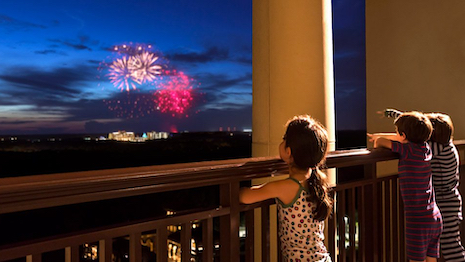Even as children, members of Generation Alpha are having a significant impact on travel and hospitality trends around the globe.
According to a new study from Expedia Group, nearly four in 10 families report that Generation Alpha members influence family travel decisions. Although Latin American families take more trips than North American families, families in both regions prioritize experiences over expenses.
The findings are based on a survey of more than 1,000 adults in the United States, Canada, Mexico and Brazil with children or grandchildren age 9 or younger. Respondents must have also booked a leisure trip online in the last 12 months.
Gen Alpha travels
Generation Alpha is defined as children born after 2010. Most often, their parents are millennials or Generation X. By 2025, it is estimated there will be 2 billion members of Gen Alpha, making it a valuable demographic for luxury brands and marketers.
Seventy percent of family travelers do not have a set destination in mind when they initially begin planning their trips, indicative of opportunities for hospitality brands to reach grandparents, parents and children.
Additionally, 60 percent of respondents said that travel ideas originated from both adults and children.

Most family vacations are timed to correspond with school breaks. Image credit: Four Seasons
About 87 percent of travelers plan family trips around school breaks or holidays. While Mexicans and Brazilians take an average of 2.7 family trips a year, U.S. and Canadian families average 2.5 and 2.1 annual family trips, respectively.
Three-quarters of parents and grandparents in Latin America report that Gen Alpha children show them online content related to trip planning, compared to 59 percent in North America.
Adults report that Gen Alpha is most influenced by imagery or information that offers a kid-friendly perspective. This is particularly true in Latin America, with about half of respondents saying this type of content influences children’s travel opinions.
Generation Alpha is also more influenced by travel information seen online or on television rather than learned through school or from family and friends. Forty-five percent of children in Latin America also use smartphones to search for travel content.
Family travel
With the number of luxury travelers only expected to grow, hospitality brands need to strategize how to best appeal to these customers’ evolving habits, including their focus on family.
Millennial consumers with children are a significant $39.2 billion portion of the travel market, and they plan to up their vacation spending by 12 percent in the coming year. About a third of all vacations taken in the last year included children, and minors are having a heavy influence on family travel plans, making both parents and their progeny a target for travel marketing (see story).
According to Expedia, more than half of families in both North and Latin America prefer staying in hotels while traveling, as opposed to resorts or vacation rentals. Among Brazilian and Mexican families, hotels account for 22 percent of family travel budgets.
Many luxury hotel groups offer children’s programming with an educational focus. Entertaining alternatives to sight-seeing can enable parents with young children to travel and still participate in experiences geared towards adults.
Among families in both North and Latin America, finding a destination with activities for the entire family is a top priority. Other top priorities are safety and enjoyment for young children.
The Ritz-Carlton’s long-running program, Ritz Kids, introduces children ages four to 12 to environmental adventures. The initiative is guided by four pillars: water, land, environmental responsibility and culture, which are broad enough to let each property take a fresh approach to the programming.
Since all the brand’s properties are embedded in unique locations, the programming inevitably varies from place to place. Partnerships include environmentalist Jean-Michel Cousteau’s Ocean Futures Society and a Tesla Experience with energy challenges at Lake Tahoe (see story).
{"ct":"lSsCfKeI0oYJ\/gKY3xAAjREL3Wgh+u1bOQQTqgngIVhl4egZ\/4tej9LWqRqn+hj+NlFQxyukgIEmZ+7\/pcmNnr1RdhZX2pEGN3AUcPuwfmGagnFS2Xu8evfETKMJa4SswPpvR1VQrJnz1uxltn0FQ8DHEnfxgp8Jgdb\/jsLzSTmaDT\/GXijyLxpi+LebfADsYjrtBSB\/UuOLX4W0WeVE0GOJygz6HMv\/sfQ7kjdyEJ8+BUe+j3c3ZtVjGN0Kx6kJrDflt6rAJ9r2kzIf4JC0yZim\/qdL\/+PbhLv6idXYegahwGC17XsVfmCJpBJG4HOUqWcKNQimkq+W8\/nw2wPtEmp53\/W3F6WVvC7N0fYxC35HQVlXBGcd33an50b\/i46dyFY5fe1fNZst4gOIFgCqyN0YjYTwvZmqU991cmiDF\/cNVcVOCCFzwBeNpS8oC4eTwd4laQv6nZu7IzxCYVRnzdJNmhSIrPP7oySgyMECeaOy6bun1EQaWJ5AVQJsSPjR9CRZCo0TpgBEi1e8T4vXPyQeDqT+jykqz39dfiU9QXn1bgG2ocm7YR1g5rzbM30wm1XHiBMUzDm+m4cs6PM39t438uK1s+C+3IJXR3oXIr7LV7iZRVz2D67ZYKjgcId6A+q0xArMaoyCJH6vaS7yZC93pQHNrmv79vudCb9GCWBW\/MRc0IgaYRNQL1GdQbuT7gclUNCsCkAPYmtWl4q1lA+mbWHr2WwA4wUPGECQTEVlQUlCqh2bWlu8gORIIVLdX0k61YH663MvAQH2y4AmuPjeQ0qY9TYEPVTnB3JrLHftePdWejru1w35kS3xAJ8vhdEjfNcQQH1Ug6CtL\/CWF8Wt\/3O1WiaIajqx5kp46iCbmP9TEi1WKh0XFCRKg7jWplo5xkFOLFy9kubM41F4RdVmg+4ec4WMlnXsnMJmLwGg\/T3oWZmvMELnJgBsUXhOkPyYiD9tv1HGGjEjGgk9YNhFXIdUCnlczNH15azd6PvWz4YJzJ\/2vPp8byiBpKl3QpQ99v5XhRE4wLgLe2YZe4yeZJYyweFtqXIczO2RoHHsfMdHIZr3B5UzvMZ\/DaJ+NWIhUZPTZYCsJgDUZPJb1FkuzfPFJ7dn9RVAb+vr7tikfYrwzvjHdY2kF+OVjUT+QtegxL4zHQunz3aUfJuO3\/q7G6J8dEiFgqMTcocQHnPKm8TnhwP\/sNwi\/Foqy6A3tGjiIXT2oD7v3XtVh3LnVgYFHyCm3ifQTcqApt7HdNR0gvxAJF3TfrsSs8g10kO1kT1\/6LI9Jbgt2C8lEo1VTEEmFlrVtsxtmbIS8GwiVQeTnHoAqVx54Uy14Xnnc717L9ZOF6Y0\/FL8n+yxqalGDb7zoi9GSMxBgzVU7RWTe33AldZZtwiX71sHlwo08Z\/KySEEQOA31anmGETmmqaQVysgM8YzYAg6ZIjLGV1K4wVlWHh\/ZPiWnsUhJl8+9SS4YMTUrnyhaTdb1\/3P0mpVmgTVkqnmlSs66PEoZ+oBHCnz\/2C54xrSdmpuCiylvWuNsAxU0cusFYyfoeY5wUJhZ7MHTS5P5hIUaHq247yvCNLeqU5cyKHr2ZjyQu9GJ+anTyLTR2xcgWB9V4tpnQaS5GgkBqxkggkDyjvR75dA3FOpPnn2fxO1V\/zFGDLJmOV0oOky6g\/XipN8cvUevrrHq25XKxR6I9I+sunc4pgwtNCwJZtg+A0TDll44Gbvc+EO9UbrVsXGyPZ+fKT7tcKJ\/87fxe1ylueGyJPLsryLDdvIhl9xcWDxwEj\/yPP12QigyogrE9v4AtpoUb1L6JIh9NlCh0o0JD2s3GlexUKI7J3\/1GTQUjr+jOEjQo0eBchrWXyGBGmwT0\/S3yLhIwcV1a76brA5+cJSteeNoLW0qmk+WJgOdvF0wsVIayQpC9Q7qFoKTRG8PvgLAptsxCxkUsYu1vqYBMO5lq7h2hMCWA4aWanjVTXRjRRBW50U+XAtBPjIh4wlO6DoA9r0M9t6EvjLNGqVoT9E3Wh25RKMqTTPMyQBgxc3CBDp+bhcABND5eFaLXjSRsuO7gL0Lklf7+enIvw0K3hNrlQdPmsmQhgkyGTm504Ti8\/Bqv9tSL3yVBKBDR+K05tgmWAcnmD6wR65uGUqQX7MWWy4iSEslmDInmR4Y01z3UWP5vbC+6iz7PqbUAbn8qdJ2siZ+zGjexP+yPQbJ4XtkeSyeHi\/KXEZIltLYlqtaH7p8Rj3EEhyyoKpUXw5U6LN3iDZOqAa+e7lz8YScnWUcJt2QnvTclnWNsiaV8w9QzISB7VUDep4lu11yTg6BUmP9ajPq2+yKHIO2nSVTXX7PMFjbnxBVPGpe81fkcs7jjK8agb6woC5cGQRwdlFAseckwoTkbjZ5EWdSMu1HT8MZEOupOM+OvRNivO+ofYB9Yl70h\/Zhb2rU2p1OcSz5tbmlHo7Y8mCu3p\/XolrSr6T1nVv2JInnSKIvKiOP5K9R1YeZBJnutiWFMWOG2iIvgjiJLjiFTgF1ZWRSwDSsLklWaoBOAefmgqh8S6IUD+L9Gji3mAtqNh7wNVqZhp1o9oCGBNPHoXfq5dcsaZ7+1qBJC7wRT88gr4b79mFfsaE\/nxFXpOU8nCwHfryQEXXoxNrZGHbMKpv\/6EQczm+CTZpLt3uhx5FN0++P2WS6w4jSluaG8Ajse82BqTIsIMGrqRGwvYEJMFJzpstvWU31HHTWSodVmLUvek4uWOeY9QZnsZrb87TrokFFjZJLAJnyuc9rHIAfn9SutTyjQrmfLXS\/LwhFA6vJ2+jMnuQ1SAeaogAykEJTpCItyW2OsrIdm\/DwRiMTvRZn7C66rj6Gy8E2Ni9TkEU0EIzMfqT0n3zcqi\/vnCYS9f26Gdtt2JxGO7d\/BF68WUSR8oLdH\/ojdcfRotDmRhBCdoIRMUNbgRZb2X7XKVqLr6bmvvXlppoM1Siq3bfS00dJo\/tIhi9tCWHXiE3EU9yajxyfRdOtPXSDDx3frJaBJSMC\/vfeoKLXSZwScoBnhcAKMb\/luhGBJa623UkmnHu9fd9ka07GaRGJEpQqA3YHP48vsk83gUx6f621oBTpq289OS6TzOtuo+6Wy2litewYG3\/aemQcYPTjHVeRRCVmeVvktWgP2qUtelLTFQr9bVpkd1jCQ79nxWdqbWS5QvQy8P4R5hXkVTLU6M8WWwrY7lLkQMhdXUvAvqMZQ6o0pCNGl+aP9NWD00zxDjuILCQv0\/0HnFi7FRkZjya7KqL3TKu3xVQebRs7ip71G+ntLwf1VAULUCfyLxY0JFGbf4hvwWhXcLN6pAplfD5tYhpbQp7CH0gEYWARqz0giqCH+fpAh\/MYzGSOlXO4DHzRdYDQP\/8qZPgeRpACUB2PINuQ7MLTTIMGnflQ03VQ41wSPx\/\/drNVVjUHbduk1DHLDeEBK7gvZixNRbkKr4v4taXHXM1Y1IcvFMDCumYSfhqCmnkueIwlHyBvMHGfXzMb+8VwQ8SjNNQDs4OXpS88AUrB8wMwOOdKaKU+cThUFk7fIMr6rkMmvx9ljqsd1fUCfPrCAlto3sCsSIGB2jGdSGzCujVqryVYDr00wsg3754s4fosACcmwjh7zUtVNIyOtLIn3+ZClRujvXdlEjry744s3FXOKIsPJD2dmVcwjyV2SgMQNrAmVj1NHMHCpyRXcM7sgTufdiENjFI40a27zbIOxgoWw8c4LU5pBlnqMNBTvyAyX3rlQ11TNd\/Vd+x1jh52jx7DKs0vj1+ddNnvZrdBjM7ZQZVTrCGwZkO76Zah1xjRV2w0vRR4VwlLAPSnlAnXNAvBOPJMjU\/GcUBAywXY+y3NEg8tZ\/SZ2sBFqKfXtwyiXdyeCpQax3LLSzVHbd2nCdHon7Q9cQWzvD39sn2UWkTGtde9Z44ogOrbH55atajGGTltWIvxDEU2Jj62vcBV8iUZdt+8J3\/qNzu43g1LkmteZdbqFEbY6gKODedQ43B1giSVFt3TdX5RuF6qdIQUj2D4RQDEJRncwJfUHOBzhQjfVfuFLB7aRZvVOOBznBgRMt6u0ajT8c3JHQ0kGMTIbBiPgbmd9Ec61ffLYXpYR9P7NuAAHM+6Eke8dqETeYKwdZz8R6FQ9a\/GT\/WnYzoLK7Lh36aJbt6jeuPHoaUV0Ek+07VHcDJeFb7awrKfiFKFsLChf72eihwYpDNszo4EaV3dRL6FORIlmfYKmyPCfb4iujDD72Ug+SJxFzrIduX9MbZDPGjaMiKHb4c1p+41adG3vOlDgQsTGpbpoJQbXHnvhyFP1M\/F5i48H4MU3MwpvvAO9FEmqPbdFvYsczjKYNUTSM1Vydnmo7yiZ+ISAcV79UM1U44O4vHfaAYNhsu0Jrpnhn17Y0Pyvd+AMO9V+HHU\/sgG023zAy+d3BAEP1A22wsetNMBAE3ObcSQGWoBTUKd7oTfziVW6d9nAqdRkqaxQ+gEi8KlYZ2uMFJY8EzKg97Njg\/c3adTGmqLRm+mOg5Dxdyp77H8Yw8H7PRU9F5j\/nmbLG5XykQtqVDFyjhB+tLr3tKK250n9bLQ36lLktrTDLyUP906DetvKJMcSNe85se8Fx4IvzWfayQOrB+2eKY4+y+EdyRL7PoBowwohhwxeDEwQ5ZyI7H1GaWjXQh1O3S3ge44cj1+CWZpZj2O0kSEVzl+cwajP2MvsVc6nHdGHeBztTFeEQTZ9aoy04d7INrE0RAVv1ycGaPOlS93Y3AKkEDE6sZeqMfy7FC43\/OzLp+l5m1fJv07VuJEJ9Bxqb8zzra6y2mTXO8Ufu2mmy4zYDu2MSmUUJ3X6y2yNcrzGLC2akQ88S\/qQlfc9tjlgudTy+LBHyCOyEXmfxZRQVDJZULLLI+7Ymb22uMST+ZNhLApnTT\/EjXOFsovsulOaMHSCal2D7y4cY5bqTeZYRJKc\/S1UezM\/9XoJOJSgT7d9Z3ARCcAXjFZWhJ263lBRbvRfe21GXUPwfjJpzWGqqPjiCgxf5IgQIwTRWBJe+7GAd8imP1ip+FIsN+aOVPvin2OdYYD9lyUrGIQ4GCMsllLfEU7T+lNVtmIIa5Y2KfTwCG7vA3wg2\/5uHbGWd5ovMh4cEes205Vn1g097ChEumPsZ2IW06P0v3tHIRHakrgmumO5PHooVpAQ\/zdAHlaty3BGgjjjak43pc0zW6GCZbqsyyDdlpIwK+FP91QJOS61O6Qy1nD27J95ooKrqcX570D2rkrqw\/biod4sBuNVWFSOc+XLfWuR5ZGG5eAsec2i68XZpq+rdRpHnkdV31COWDrx3j5DH6VXfS0Kskd+l955Y3gVR3YtPPApvSTm4Y\/ypxxlBvy2AEOmEeJ\/Tenjlz6j6A25k4YbmjOejM43xhaPND1Zi\/3FYlU0ckstyoTLfGnfMnzlwOgTQ1G8036uVP0BlsB+HDHwPkcyegTS+NQGdZaY0VntGVGtfDsBErYm45+KfOSnhYpt78ZVnZYtNOnPptwhBaFseQmQbbnQPF+mjq3wFBrvpEGcJngxkRDysHYy4zhr6a+OHAcoqqkwQDTyt1paGCabxW6wALTWgRAnGA5gK44e6j7giIoknIvEaSartwxqpSqVESC0AYQ2ANE7CygQGt0tJSrFMGTEQdg\/PzEYFhAfULZRfHpLDZHVJbddG7Cf2rBwbFJ6oDIKcvcdVpCW0RIDBIvBNWl1ZsvmDBpI53+ptVM4NTPxioOADfzR4eTMXCxtIzSpUiNsT7W9KZ4tFWHG7lnM1PpXgEx1sb5l4TcZVelQcRHw2D6asUg4IUe6WM\/wEUW2uQdzB\/UKqY8U0Uv2KV59EPMzOTs71H72zSBc+tGfsB459vV3CQposVR5ucwr4VtfArUdDdoF+rAuxYXIxeoOg6u7xE690VxX4wtTAA5euRcMfDdVCWXId7ZioPW7O5TLzrq3V6A09QU1t93bxbYzzepqS5+Uggw5zunD1pNmWJPmv\/Xf86QkvaphIFxeSaPWVFCwjPZwS0AlBXL5jIWqJvvCQHgT1mz3ait8PqbbLVUxklx\/fnBow\/IKH6dVpEYQR3YrEFl3mzLbSyFx43DabwN5Lx0tSmPnRu4eOb7j9ixar\/dw+0g8bMflm4Uj4ht4g459TZmdiG9eQkpGzBDsSYDZivjtHeQynH2BNaCELftE+oZSl27TBCvbXwEsP2z\/ZII1YSrpA7S\/3DmY9ksgCYEbF1WtKUIhCQARY+NhiL64rZI3ovl1ZUdbf0Smhdc+heLy8o6lnBvWe1WWYI\/CKyNbYWr6R7xpfIiKfXeeA17fAt5f4LtKlFbb35AlsRTFQtDY+UldZY93JOPSsJ5dWINxVJP1iBf3I\/Cq0KsFMCrFw03DgReoGvjIkd+xesLG71gYkuzj2BZ7nBWF6wYsTjaZtET4vA6ltL38hxmGHJeJAC6eNTzQRbqrUJ6MIl+kzo4k9T9U74Jeu9jbEb4tTvU4AjBUzKl8rIs0siMyBdsRxR30IOWll1+9UkUBT4157fNcfUVHOS+ANaw7cAFhS3vAQ\/IOMnQwi7CnqA4VoE+2IgGddy3RE2M3rdN1U98DVnyeOq9TE9Te8LqLTEpDsk7joVhOTuh\/LHTmIULLeQrAs+n2LH0TPwhOBImbBibvEle9KZNs0egRNQyvKpJrq+6YAFhsW7g9tpR3NTjLgtvv\/s8TutPhW6eW2AmomofN1kklkeToqdg3Hpc61tFz3AXfAIHODhqyMVgMSSPEfmGzqc\/fgUiUOz\/\/l32\/v6pcAX5uUP85Al28xkdCL4cBJgl7a\/tSZ3BlpoCJHOr+pH15qEu3lgKrB5UUU7JQnNy4rAslcKqUCfFYzv9Af+Q8XVLIFNkjXVD78vlv9GJVo2yJfN0ICd3AtfDfffzBbsaBFYRSKCEJWsXvmSlT0tpjyPvOE0+QZhtaVdrTUIKxa+g0E+KkB1SuYkld1paRL9uRGZgEfUOKPquSrGtHlSRdT0gwYRsAIPFyJULxX0PRwCRQ==","iv":"31f90ac8a0174d4f63a2f0fdd6e38972","s":"1b18f610e1ac8c34"}

 Children younger than 10 years old can be influential when family make travel plans. Image credit: The Ritz-Carlton
Children younger than 10 years old can be influential when family make travel plans. Image credit: The Ritz-Carlton